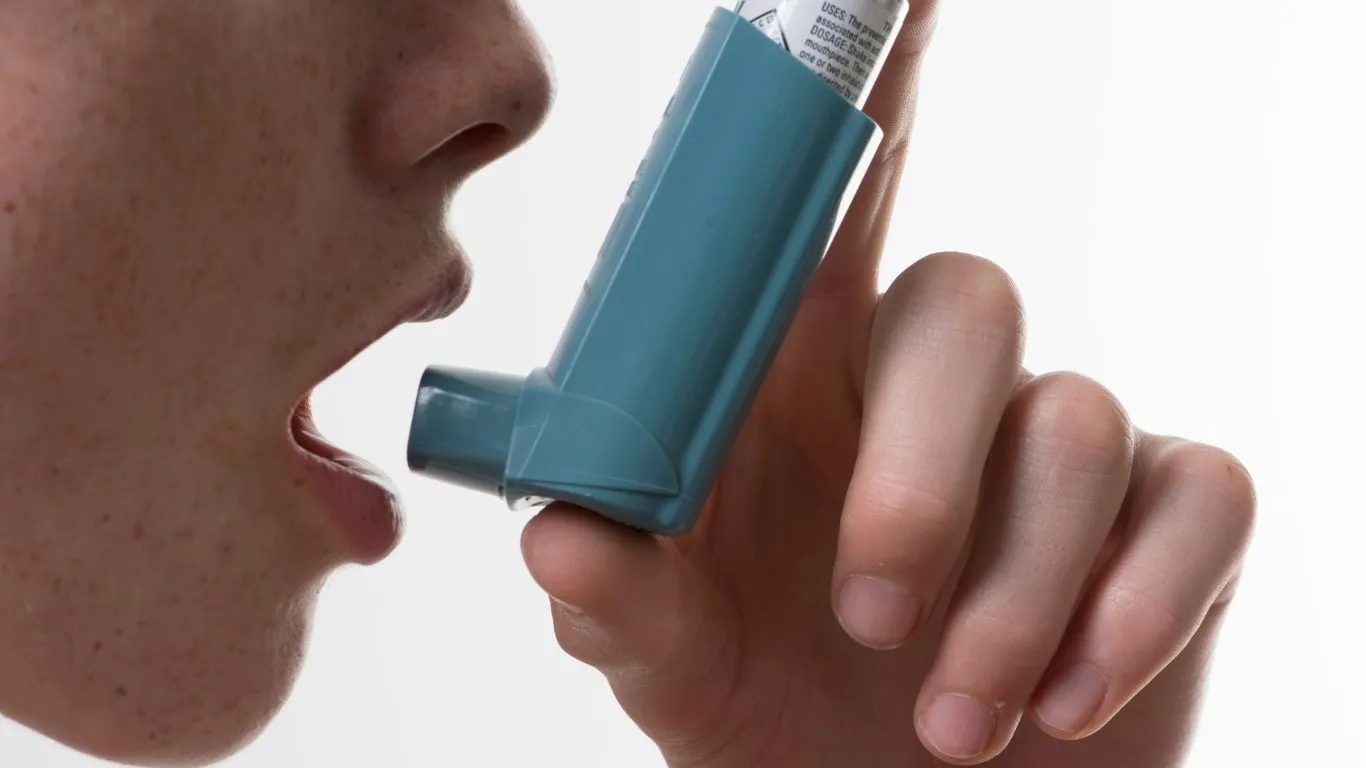Why Asthma Is More Common at Night and How to Manage It Effectively
As a pulmonary nurse with years of experience, I’ve had my fair share of questions from patients about asthma. One common question that comes up frequently is, “Is asthma more common at night?” It’s a valid concern, especially for those who find themselves struggling to breathe when the sun sets. Asthma, a chronic respiratory condition, can indeed worsen at night for various reasons. In this post, we’ll dive deep into why asthma symptoms are more pronounced during the night and how you can manage them effectively. My goal is to provide you with not only facts but also some tips that I’ve seen work in practice.
Why Asthma Worsens at Night
If you’ve ever experienced waking up in the middle of the night, gasping for air, you know exactly how terrifying it can be. But why does this happen? Why does asthma tend to flare up more at night than during the day? There are several factors at play here, some environmental and others related to our body’s natural rhythms. Let’s take a closer look at the top reasons.
The Role of the Body’s Circadian Rhythms
One major factor contributing to nighttime asthma exacerbations is the body’s natural circadian rhythm. Our bodies follow a 24-hour cycle, which affects everything from sleep to lung function. At night, the production of certain hormones, like cortisol, naturally decreases, which can make asthma symptoms worse. Cortisol is a natural anti-inflammatory hormone, and its reduction can lead to increased inflammation in the airways, making it harder for you to breathe.
Additionally, during sleep, the body’s airway muscles tend to relax. For those already dealing with asthma, this can result in narrowed airways, making breathing even more difficult. I’ve noticed that many of my patients with asthma report feeling fine during the day but struggle to sleep due to shortness of breath. This relaxation of airway muscles is just one example of how the body’s rhythms can affect asthma symptoms.
Increased Sensitivity to Triggers at Night
At night, our sensitivity to common asthma triggers also tends to heighten. Dust mites, pet dander, and mold tend to accumulate more in our bedrooms. You might not notice it during the day when you’re active, but when you lie still in bed, these allergens can become more noticeable. The allergens we encounter at night are often in close proximity, since we spend so much time in our bedrooms while sleeping.
Something I often recommend to my patients is a deep cleaning of their bedroom, including washing bedding in hot water, regularly vacuuming, and using allergen-proof covers for pillows and mattresses. Small changes like these can significantly reduce asthma flare-ups at night.
Common Nighttime Asthma Symptoms
It’s one thing to understand that asthma can worsen at night, but it’s another to know what signs to look for. Nighttime asthma symptoms can differ from those you might experience during the day, but they’re just as important to address. Let’s explore the common symptoms that might indicate your asthma is acting up after dark.
Shortness of Breath and Wheezing
Shortness of breath is one of the most common asthma symptoms, and it’s often exacerbated at night. This happens because the airways narrow, making it more difficult to get enough air in. Wheezing, the whistling sound you hear when exhaling, is another symptom that may worsen when you’re lying down. If you find yourself waking up in the middle of the night wheezing or struggling to catch your breath, it’s crucial to address the underlying causes.
Coughing That Interrupts Sleep
Another hallmark symptom of nighttime asthma is coughing that disrupts sleep. Asthma-related coughing typically gets worse at night due to the body’s decreased cortisol levels and increased sensitivity to allergens. This can lead to prolonged coughing fits that make it difficult to fall or stay asleep. I’ve had many patients tell me that their asthma-related coughing spells often last for hours, making for a very restless night.

How to Manage Nighttime Asthma
While it’s clear that asthma can worsen at night, there are many strategies you can use to manage and even prevent these nighttime symptoms. Managing nighttime asthma often requires a combination of lifestyle changes, medication adjustments, and environmental modifications. Here are a few things that can help you sleep better while keeping your asthma in check.
Ensure Your Medication Is Working
If you’re having trouble managing your asthma at night, your medication regimen may need an adjustment. Some asthma medications are designed to be long-acting, providing all-day or all-night relief. However, if your medication is wearing off before nighttime, you may need to talk to your doctor about adjusting the dosage or type of medication you’re using. In my experience, some patients benefit from a “controller” medication, such as inhaled steroids, which helps reduce inflammation in the airways before nighttime triggers can worsen symptoms.
Elevate Your Head While Sleeping
For many patients, lying flat can make asthma worse due to increased pressure on the airways. A simple trick is to elevate your head and upper torso while sleeping. Using an extra pillow or a wedge pillow can help prevent your airways from narrowing, making it easier to breathe. This tip may seem small, but it can make a huge difference for those suffering from nocturnal asthma symptoms.

Limit Exposure to Common Triggers
As mentioned earlier, allergens in the bedroom, like dust mites and pet dander, can trigger asthma symptoms at night. To minimize exposure, consider using high-efficiency particulate air (HEPA) filters in your bedroom and living spaces. I also recommend avoiding pets in the bedroom, if possible, and regularly cleaning surfaces where dust and dander tend to accumulate. These changes can significantly reduce nighttime asthma flare-ups.
The Bottom Line: Is Asthma More Common at Night?
In short, yes, asthma is often more pronounced at night. The combination of circadian rhythm changes, increased exposure to allergens, and other factors can make nighttime asthma attacks a common occurrence. However, by understanding the reasons behind these flare-ups and using the right management strategies, you can improve your sleep quality and minimize the impact asthma has on your nightly routine.

Managing Asthma at Night: Tips for Better Sleep
As we discussed earlier, nighttime asthma flare-ups can be quite unsettling. While it’s understandable that asthma may worsen during the night due to a variety of factors, the good news is there are several strategies you can incorporate into your routine to manage asthma symptoms effectively. These adjustments aren’t necessarily difficult to implement, and many can lead to more restful nights and better overall control of your asthma.
Create a Sleep-Friendly Environment
Your bedroom environment plays a significant role in how well you sleep, especially if you’re managing asthma. If your bedroom is filled with allergens, like dust mites, pet dander, or mold, these can trigger your asthma symptoms, making it harder to get a peaceful night’s rest. But don’t worry – there are several ways you can minimize your exposure to these triggers and breathe easier while you sleep.
One thing I always recommend to my patients is investing in a high-quality air purifier. A HEPA filter can help reduce airborne allergens that might worsen asthma. I’ve personally seen improvements when patients make this simple change in their room. Also, regularly washing your bedding in hot water is key. I can’t stress this enough – dust mites love to hide in sheets and pillows, and washing them once a week can help prevent them from making your asthma symptoms worse at night.

Consider Your Sleep Position
If you’ve ever had a hard time breathing at night, you might have noticed that your sleep position can make a huge difference. When you lie flat on your back, gravity can put pressure on your lungs, making it harder to breathe. The good news is, adjusting how you sleep can help alleviate some of these symptoms. I’ve often advised my patients to sleep with their head slightly elevated. This allows the airways to stay more open and helps reduce the sensation of shortness of breath. Try using a wedge pillow or adjusting the head of your bed if you have a more adjustable model.
Additionally, some people find it beneficial to sleep on their side rather than their back. Sleeping on your side may help relieve pressure from your lungs and prevent mucus from accumulating, which could trigger coughing or wheezing during the night. It’s all about finding the sleep position that works best for you, so don’t hesitate to experiment a little.
Monitor and Manage Your Triggers
Asthma triggers are a big part of why asthma symptoms flare up at night, so identifying and managing those triggers is crucial to keeping your asthma under control. Whether it’s allergens, temperature changes, or irritants like smoke, the more you can reduce exposure to these triggers, the better your asthma symptoms will be.
Watch Out for Temperature and Humidity Changes
Temperature fluctuations and humidity can significantly impact asthma symptoms, particularly at night. Cold, dry air can irritate your airways and make it harder to breathe, while warm, humid conditions can promote mold growth or increase the levels of dust mites. If your bedroom tends to get chilly at night, consider using a humidifier to keep the air moist and prevent your airways from drying out. Just make sure to clean the humidifier regularly to avoid mold buildup, as that can be another asthma trigger.
Another way to manage temperature-related triggers is by dressing in layers. If it gets cold during the night, make sure you have enough blankets, but avoid using thick quilts that might trap dust or allergens. You might also want to wear a lightweight scarf or sweater to keep your airways warm without making yourself too hot.

Limit Exposure to Smoke and Other Irritants
Exposure to smoke, whether from cigarettes, cooking, or nearby fires, is a well-known asthma trigger. For many patients, even the faint smell of smoke can set off symptoms, particularly at night when the body is already more sensitive. If you’re a smoker, quitting can dramatically reduce your asthma symptoms. But even if you don’t smoke, it’s important to minimize exposure to secondhand smoke, as well as other common irritants like strong cleaning products or perfumes.
If you live in a particularly polluted area, you might want to consider using an air purifier in your bedroom to reduce the effects of outdoor pollutants. A simple change like this can really help make a big difference in managing nighttime asthma.
Medication Adjustments for Nighttime Relief
Sometimes, asthma medication needs to be adjusted to provide better control, especially for nighttime symptoms. If you find that your asthma symptoms consistently worsen at night, it’s a good idea to talk to your healthcare provider about your medication regimen. There are several options available that can help you manage your asthma more effectively during the nighttime hours.
Inhaled Corticosteroids and Long-Acting Beta-Agonists
Inhaled corticosteroids (ICS) are often prescribed for long-term asthma control. They work by reducing inflammation in the airways, which can help prevent nighttime flare-ups. I’ve seen firsthand how effective ICS can be for managing nighttime symptoms when taken consistently. Some patients may need to use a combination inhaler that includes a long-acting beta-agonist (LABA) alongside the corticosteroid. LABAs help keep your airways open for longer periods, preventing the nighttime narrowing of the airways that can lead to wheezing and shortness of breath.
Rescue Inhalers for Immediate Relief
If you wake up in the middle of the night struggling to breathe, having a quick-relief (rescue) inhaler on hand is crucial. These inhalers contain bronchodilators that quickly open up the airways, providing fast relief from asthma symptoms. While rescue inhalers are not meant to be used as a long-term solution, they can be life-saving in moments of acute distress. Always make sure your inhaler is within reach during the night, and double-check that it’s not expired.

In addition to medication adjustments, your healthcare provider might recommend a daily asthma management plan that includes monitoring your peak flow (how fast you can exhale) to track your lung function. Keeping a diary of your symptoms and peak flow readings can help you and your provider understand how well your asthma is controlled and whether any changes are needed to improve your nighttime asthma management.
Additional Lifestyle Changes for Managing Nighttime Asthma
Aside from medication and creating the right environment, there are other lifestyle changes that can greatly improve your asthma symptoms at night. These changes are easy to incorporate into your daily routine, and many of them will have a positive impact on your overall health as well. As a pulmonary nurse, I’ve seen how small adjustments can lead to big improvements for people dealing with asthma.
Maintain a Healthy Weight
Managing your weight is important for many aspects of health, and it can play a significant role in how well you manage your asthma. For people with asthma, excess weight can put additional pressure on the lungs, making it more difficult to breathe, especially at night when asthma symptoms are most likely to flare up. I’ve often seen patients who have successfully reduced their asthma symptoms by losing just a few pounds. While it’s not always the main factor, a healthy weight can make a noticeable difference in your lung function and overall asthma control.
Maintaining a balanced diet and staying active can help keep your weight in check. Regular exercise also improves lung capacity and strengthens your respiratory muscles, helping you breathe more easily, even when you’re asleep. But remember, if you’re starting an exercise program, be sure to talk to your healthcare provider first, as they can guide you on the best approach that works with your asthma.
Practice Relaxation Techniques
Stress can be a huge trigger for asthma, and it often manifests more intensely at night when we’re winding down and reflecting on our day. To help keep your asthma symptoms at bay, consider incorporating relaxation techniques into your evening routine. Meditation, deep breathing exercises, or even some gentle yoga can help lower stress levels and improve your ability to breathe deeply.
I’ve had patients who have seen real improvements in their nighttime asthma symptoms simply by practicing a few minutes of deep breathing or mindfulness before bed. The goal here is to help your body relax and prevent stress from causing any unnecessary tightness in the chest, which can trigger an asthma attack.

When to Seek Help from Your Doctor
While there are plenty of strategies you can implement at home to manage nighttime asthma, there are times when professional help is necessary. If your asthma symptoms are consistently affecting your sleep, it’s essential to seek advice from a healthcare professional. I’ve had many patients who were able to better manage their asthma after discussing their symptoms and treatment options with their doctor. Here are some signs that it’s time to seek medical attention:
Increased Frequency of Nighttime Symptoms
If your asthma symptoms are occurring more frequently at night, despite following your medication regimen and environmental adjustments, it may be a sign that your asthma is not under control. Your doctor might suggest adjusting your medication or try a different combination therapy to better manage nighttime symptoms. In some cases, a higher dose of certain medications or additional treatments may be necessary to provide the relief you need.
Severe Asthma Attacks During the Night
If you’re experiencing severe asthma attacks that wake you up from sleep, this could be a warning sign that your asthma is worsening. Severe nighttime asthma symptoms can include difficulty breathing, excessive coughing, or a feeling of tightness in the chest. These symptoms should be taken seriously, and it’s important to consult with your healthcare provider right away. They can help assess your lung function and determine if further interventions are needed.
Changes in Your Asthma Symptoms
Any significant changes in your asthma symptoms, such as increased wheezing, shortness of breath, or the need for more frequent use of your rescue inhaler, should not be ignored. These changes might indicate that your asthma is not well-controlled and that it’s time to reassess your treatment plan with your doctor. Keeping a symptom journal can be incredibly helpful in tracking these changes, as it provides valuable information for your healthcare provider to make informed decisions about your treatment.

Asthma and Sleep Apnea: A Potential Connection
It’s also important to consider the possibility of sleep apnea, especially if you’re waking up frequently at night and feeling very fatigued in the morning. Sleep apnea, a condition where your breathing repeatedly stops and starts during sleep, is common among people with asthma. If you have asthma and you’re experiencing symptoms such as loud snoring, choking, or gasping for air during the night, you might want to bring this up with your doctor. They may recommend a sleep study to determine if sleep apnea is contributing to your nighttime breathing difficulties.
In many cases, treating sleep apnea can also help improve asthma symptoms. Managing both conditions can lead to better overall health and improved sleep quality. Be sure to discuss any concerns you have with your healthcare provider, as they can guide you in the right direction.
References
If you’d like to learn more about managing asthma or get more insights on the latest research, here are some great resources to check out:
Disclaimer
The information provided in this article is intended for informational purposes only and is not a substitute for professional medical advice, diagnosis, or treatment. Always seek the advice of your physician or another qualified health provider with any questions you may have regarding a medical condition. Never disregard professional medical advice or delay in seeking it because of something you have read here. If you think you may have a medical emergency, call your doctor or dial emergency services immediately.

Bianca Nala is a compassionate Nurse Practitioner with a strong background in primary and respiratory care. As a health writer for Healthusias.com, she combines her clinical expertise with a talent for clear, relatable storytelling to help readers better understand their health. Bianca focuses on topics like asthma, COPD, chronic cough, and overall lung health, aiming to simplify complex medical topics without losing accuracy. Whether she’s treating patients or writing articles, Bianca is driven by a single goal: making quality healthcare knowledge accessible to everyone.







